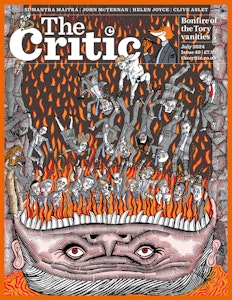This article is taken from the June 2024 issue of The Critic. To get the full magazine why not subscribe? Right now we’re offering five issues for just £10.
Have you ever seen footage of a beetle moving under the control of a parasite? Hollowed out, the horrifying, brainless critter stumbles forward as a hostile entity compels its legs to take stilted steps. This is the grisly picture that comes to mind reading Gareth Roberts’ Gay Shame: The Rise of Gender Ideology and the New Homophobia.
In his riotously funny yet gravely depressing polemic, Roberts charts how trans activists took over the once worthy gay rights struggle, devouring the hosts from the inside out and setting the animated corpse on a path to oblivion.
Roberts is ruthless in his appraisal of gay male culture, dissecting it with the withering accuracy of a queen critiquing the sartorial choices of passers-by from a Soho café. And he displays basalt balls when taking on his brethren by facing up to gay male misogyny and tweaking the plastic nipples of drag queens.
He is explicit about the “percolating resentment and sexual jealousy of women” of many homosexual men. He traces these sentiments from the closed male communities of his youth where “open disgust for women’s bodies and anatomy” was the norm, through to Ru Paul’s Drag Race, where gay men make jokes about women’s sexual organs for a mass television audience.
This deep-rooted, unspoken envy of womanhood that many gay men harbour is why, Roberts says, so many cheer on the young women chopping off their breasts to become simulacra of men. It is also, he argues, behind the attitudes of men such as Owen Jones, who profess to believe that “trans women are women” until they decide to find a surrogate to start a family.
He pithily notes that to such gay male trans activists “a man becomes a woman with a click of his fingers; and a womb is a free-floating commercial service that some people just happen to possess”.

The book follows the illogical logic of transgenderism to its end point: the “elimination of homosexuality — as taken to the extreme in the ideology of the Iranian state”. Using their own words, he powerfully demonstrates the internalised homophobia and externalised sexism of the minority of gay men who identify as women. He also rails against heterosexual women “gaycrashing” gay male dating apps such as Grindr, persuasively arguing that lesbians and gay men ought not to be “reduced to the playthings of paraphilic straight people”.
Roberts has lived through the state-sponsored homophobia of the AIDS crisis into a time where being gay is essentially unremarkable. And yet, for all the progress made, he acknowledges that being same-sex-attracted will always be disconcerting to some of those coming to terms with their sexual orientation. Once organisations like Stonewall would reconcile people to this, but today such LGBTQ charities are actively undermining gay rights.
Roberts points out that Stonewall’s outgoing chief executive Nancy Kelley compared lesbians not wanting relationships with “transbians” (i.e. straight men who identify as lesbian women) to “sexual racism”.
Meanwhile, dumbly unaware of this ideological shift, human resources departments across the UK have invited “equality experts” to train staff and advise on policies, baking the nonsense of genderism into British institutions.
Tellingly, whilst Roberts’ message is ultimately unifying, he does point to a much larger social fault line between men and women. When he opens the doors to the seedy gay saunas and switches on the lights in dark rooms, he is not making a moral judgement based on sexual orientation, but observing how any man might behave in the absence of women.
He wryly notes that “straight men’s eyes often pop out on envious stalks when you tell them of the accessibility and variety of sex on easy offer in the gay world”. The blindness of most women to men’s proclivities is an understandable lacuna in the book.
Gay Shame has hit the shelves in the same month as the Cass Review, whose findings have vindicated Roberts and the many others who warned about the unfolding medical scandal of trans medicine. But this book does not stand out because of the urgency of its arguments, nor even their moral worth. It is worth reading because it is a tonic. Roberts holds up a mirrorball to gay male culture steeped in trans activism and the sycophantic, straight rainbow flag-wavers. And he doesn’t merely give them a tentative prod, he rips in with a satisfying bloodlust. To use a phrase favoured by drag queens, Roberts “slays” in Gay Shame.
As I closed the cover I was left thinking that I’m just bloody glad we’re on the same side.
Enjoying The Critic online? It's even better in print
Try five issues of Britain’s newest magazine for £10
Subscribe



